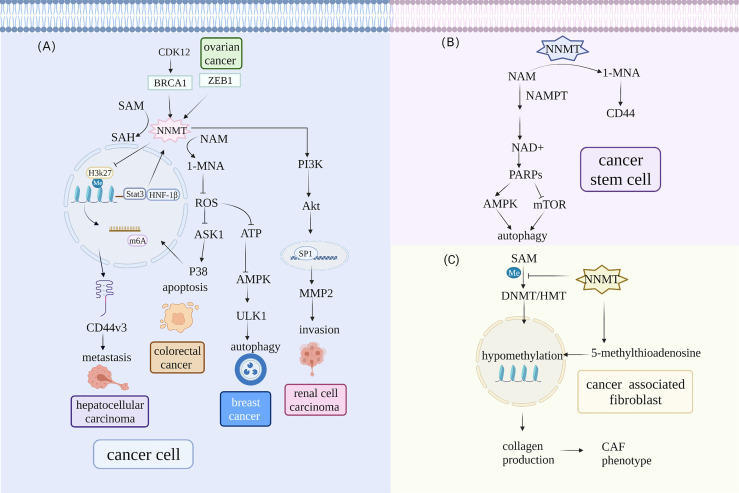Figure 1.
NNMT participates in different signaling pathways in the TME. (A) NNMT expression is directly regulated by transcription factors and subsequently affects metastasis, invasion, apoptosis, and autophagy via a series of downstream signal pathways in cancer cells. Hepatocyte nuclear factor 1β (HNF-1β) and STAT3 can regulate NNMT levels. Moreover, BRCA1 can occupy the NNMT promoter and regulate NNMT expression. In hepatic stellate cells, upregulated NNMT expression alters H3K27 methylation status and affects the N6-methyladenosine (m6A) of CD44, which contributes to tumor metastasis. NNMT promotes clear cell renal cell carcinoma invasion and metastasis by altering matrix metalloproteinase 2 expression. NNMT also lowers the phosphorylation of AKS1 that is an upstream signal of the p38-MAPK pathway and reduces apoptosis in colorectal cancer cells. NNMT can alter protein phosphatase2A methylation status and influence ULK1 activity to regulate autophagy in breast cancer. (B) NNMT regulates autophagy in CSCs by influencing NAD+ metabolism. NNMT decreases the activity of NAD+-dependent enzyme PARP1 that can influence autophagy by upregulation AMPK pathway and downregulation mTOR pathway in CSCs. (C) NNMT overexpression contributes to global hypomethylation and promotes CAF formation. NNMT can elevate 5-methylthioadenosine levels and contribute to global hypomethylation, which alters the methylation status of genes involved in collagen production and promotes Normal fibroblasts acquiring CAF phenotype.

